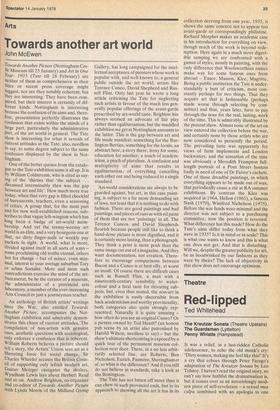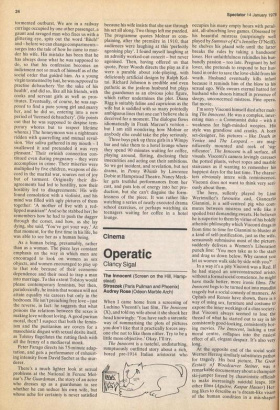Theatre
Red-lipped
Ted Whitehead
The Kreutzer Sonata (Theatre Upstairs) The Guardsman (Lyttelton) Penny Whistle (Hampstead)
It was a relief, in a lust-ridden Catholic adolescence, to echo the old monk's cry: 'Dirty women, making me feel like this!' It's a cry that echoes through Peter Farago's adaptation of The Kreutzer Sonata by Leo Tolstoy. I haven't read the original story, so can't say how faithful the dramatisation is, • but it comes over as an astonishingly modern piece of self-revelation — a sexual mea culpa combined with an apologia in one
tormented outburst. We are in a railway carriage occupied by one other passenger, a gaunt and ravaged man who fixes us with a glittering eye, spits out the word 'Bitch!' and — before we can change compartments — surges into the tale of how he came to murder his wife. His mistake has been that he has always done what he was supposed to do, so that his confession becomes an indictment not so much of himself as of the social order that guitled him. As a young virgin tormented by lust, he wassupposed to practise debauchery 'for the sake of his health', and did so, like all his friends, with cooks and servant girls as well as prostitutes. Eventually, of course, he was supposed to find a pure young girl and ..marry her, and he did so, entering into a new period of 'licensed debauchery'. (He points out that he was supposed to despise temporary whores but to respect lifetime whores.) The honeymoon was a nightmare ridden with quarrelling and mutual revulsion. 'Her saliva gathered in my mouth — I swallowed it and pretended it was very pleasant.' Their swinish connection continued even during pregnancy — they were accomplices in crime. Their miseries were multiplied by five children, weapons of discord in the marital war, sources not of joy but of torment. Originally their disagreements had led to hostility, now their hostility led to disagreements. His wife found consolation with a violinist, and his mind was filled with ugly pictures of them together: 'A mother of five with a redlipped musician!' And so he stabbed her; he remembers how he had to push the dagger through the corset, and how, as she lay dying, she said, 'You've got your way.' At that moment, for the first time in his life, he was able to see her as a human being.
As a human being, presumably, rather than as a woman. The piece lays constant emphasis on the way in which men are encouraged to look on women as sex objects, and women encouraged to play up to that role because of their economic dependence and their need to trap a man into marriage. To this extent Tolstoy would please contemporary feminists, but then, paradoxically, he insists that women will not attain equality via careers but only in the bedroom. He isn't preaching free love—just the reverse, in fact: he suggests that what poisons the relations between the sexes is making love without loving. A good puritan moral, then? I suspect that both the feminism and the puritanism are covers for a masochistic disgust with sexual desire itself, as Tolstoy flagellates the rutting flesh with all the frenzy of a mediaeval monk.
Peter Farago directs his 75-minute adaptation, and gets a performance of exhausting intensity from David Suchet as the murderer.
There's a much lighter look at sexual problems at the National in Ferenc Mol nar's The Guardsman, the story of an actor who dresses up as a guardsman to see whether he can seduce his own wife, but whose ache for certainty is never satisfied because his wife insists that she saw through his act all along. Two things left me puzzled. The programme quotes Molnar as complaining, after the premiere in 1910, that audiences were laughing at this 'perfectly agonising play'. I found myself laughing at an adroitly worked-out conceit — but never agonised. Then, having offered us that quote, Peter Woods directs the play as if it were a parable about role-playing, with deliciously artificial designs by Ralph Koltai. Richard Johnson is credible and even pathetic as the jealous husband but plays the guardsman as an obvious joke figure, which rather undermines the plot. Diana Rigg is suitably feline and capricious as the wife but is saddled with so many pointedly ambiguous lines that one can't believe she is deceived for a moment. The dialogue flows idiomatically in Frank Marcus's version — but I am still wondering how Molnar or anybody else could take the play seriously.
Three boys pick up three girls in a Wimpy bar and take them to a hotel lounge where they spend 90 minutes waiting for coffee, playing around, flirting, disclosing their insecurities and acting out their ambitions. So we get incident, and revelation, but not drama, in Penny Whistle by Lawrence Dobie at Hampstead Theatre. Nancy Meckler gets truthful performances from her cast, and puts lots of energy into her production, but she can't disguise the formlessness of the piece. It was rather like watching a series of neatly executed drama school exercises, or perhaps watching six teenagers waiting for coffee in a hotel lounge.































 Previous page
Previous page